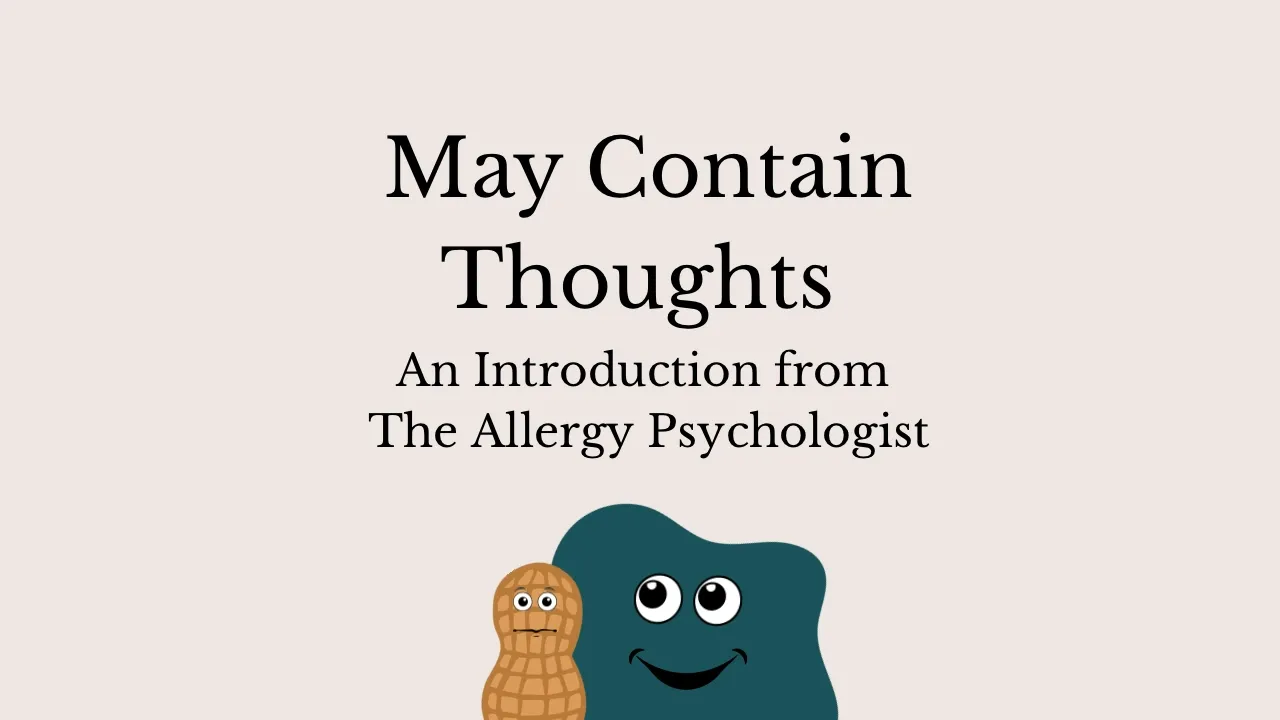May Contain Thoughts: An Introduction from The Allergy Psychologist
Oct 17, 2025
Hello, my name is Dr Francesca Sawer and I’m a clinical psychologist who has worked in the NHS for over 14 years.
Social media will convince you that life is beautiful and amazing, and I’m not saying it can’t be, but let’s be real a lot of the time it’s often a s**t show, it’s messy, it’s raw and it throws us all sorts of hurdles from every angle.
As a clinical psychologist, my job is to help people when life gets hard. Some might have a formal diagnosis of anxiety, depression, panic etc, but you don’t have to have an official label to benefit from clinical psychology. I use evidence-based therapy, highly skilled questioning and insights, to help you understand yourself and make sense of the why, before developing a set of personalised tools and strategies which will best support you and leave you more equipped to make manage life twists and turns.
I’ve worked in hospital settings for most of my career, so this means supporting those living with health conditions and the subsequent impact this has on their emotional wellbeing.
In 2019 I found myself working in a specialist paediatric allergy service, and I say found myself, because it was actually unusual set of circumstances which led to be me approached for the job (a story for another time) but let’s just say I believe it was fate and this job would ignite one of the biggest passions of my life.
I started the job, full of enthusiasm and experience, but looking back, also with complete naivety, as to just how significant I now know the role of clinical psychology to be in the support of allergies.
As clinical psychologist we’re one of the highest trained mental health professionals, but even my years of training until this point hadn’t given me any training on allergies.
My job as an allergy psychologist wasn’t just supporting children who had procedural anxiety (which is the name we give to fear of hospital procedures such as skin pricks and blood tests), it was supporting families who had witnessed their children have anaphylaxis and the lingering impact this trauma was having. It was supporting parents riddled with guilt, some believing they had contributed to causing allergies and others managing the fall out of the life they were adjusting to since allergy diagnosis and post-reactions.
It was the anxiety, living in constant fear of reactions, the heavy weight of the responsibility for keeping children safe, and the daily reality that there are threats all over the place and that no amount of control can fully protect you from. For some this resulted in cocooning themselves and their families, trying their best to shelter from a world of potential dangers, for many it was dealing with lack of understanding from friends and family which made trailing new experiences so hard.
It was needing to manage every single day, something that never went away, dealing with anxiety on repeat. It was finding the words to try and explain, knowing they often wouldn’t be understood anyway. It was sitting with the emotions so heavily but this thing being so invisible to the world around.
It was frustration, resentment and sadness on top of the exhaustion of managing all the practicalities of allergy management, and for many this being a new and completely overwhelming experience.
And whilst we’re seeing advancements in treatments and options for families that on the surface offer hope, they also come with a hidden emotional minefield to navigate.
Across all the areas of health I’ve worked I can honestly say that allergies is the area which is so wide ranging from a psychological perspective. The complex interweaves of anxiety, stress and allergic reactions, how misunderstood it is but how food allergies are and the seeing how the impact is so holistic; with a ripple effect on so many areas of life. This isn’t just what I see in practice, but this is backed by the research, with the recent Global Access to Psychological Services for Food Allergy (GAPS Study) Knibb et al (2024) showing over 70% of patients and care givers to have good anxiety related distress.
This is not just misunderstood, but it is a complete blind spot for so many, with people not even knowing what they don’t know, including naive psychologists like me (up until 6 years ago). The GAPS study also found that only 1 in 5 people had been asked about their distress by a professional.
We’ve made so much progress, yet so much still needs to be done in this space.
I’m one of only a handful of clinical psychologists specialising in allergies in the U.K. I’ll be honest, at times this is overwhelming.
I get the privilege of working with so many children, teenagers, adults and parents who trust me in their most vulnerable moments, but I know I can only help so many people and there are so many more going without support or don’t even know such support is there. It can be isolating, knowing how important my role is but there not being many other clinical psychologists or therapists who understand.
My work is always based on evidence and informed by theory and models, yet I’ve found that lots of the ways I am trained aren’t completely relevant to of the uniqueness that allergy brings - the danger isn’t irrational and typical exposure models for anxiety are not safe.
I’ve created my own methods which have helped so many, but I know can help so many more.
So, this blog is going to be my way of starting to articulate just some of the thoughts in my head. To share some of my ideas, which can’t just be summarised in a 40 second videos which more recently I’ve felt I have to do, in order to try and try and get my ideas into the world via the minefield that is social media.
Thanks for reading and be sure to be signed up to my mailing list to receive weekly tips (promise they are shorter than this).
Stay Connected...
Receive weekly actionable tips and strategies from me straight to your inbox.
I promise not to send you spam and you can unsubscribe at any time!

